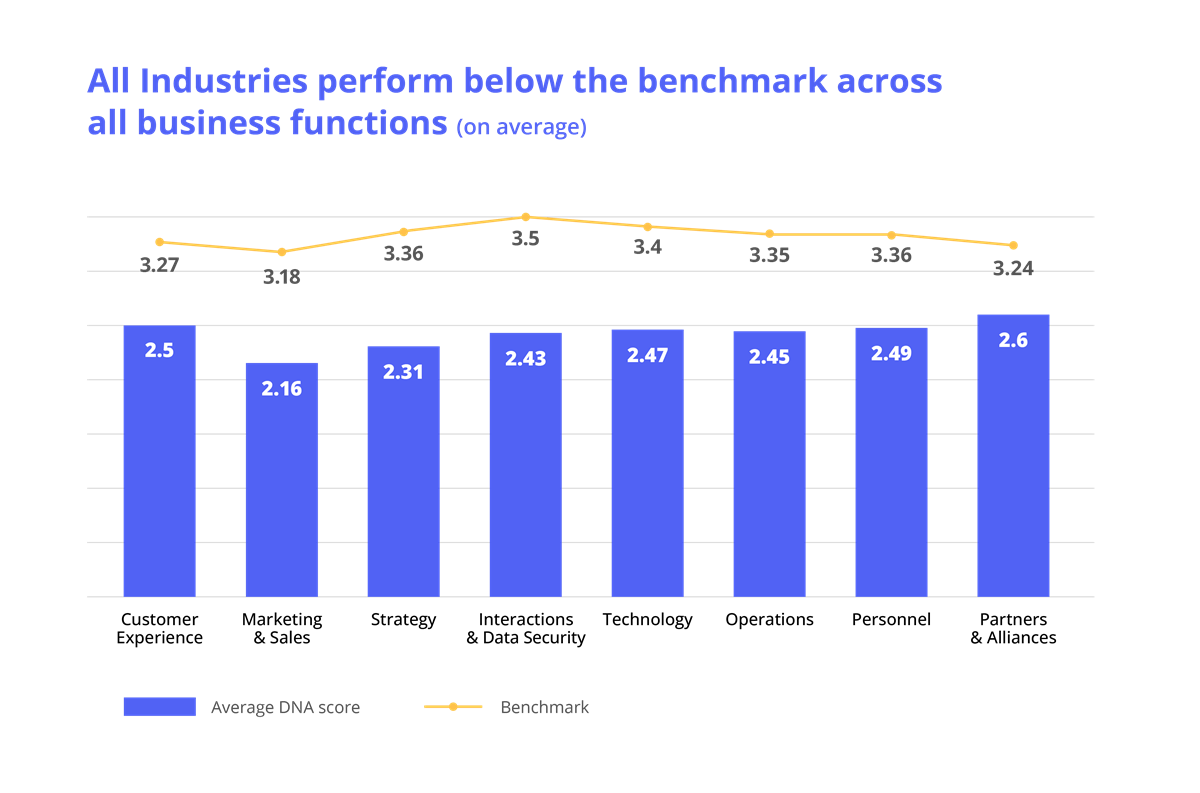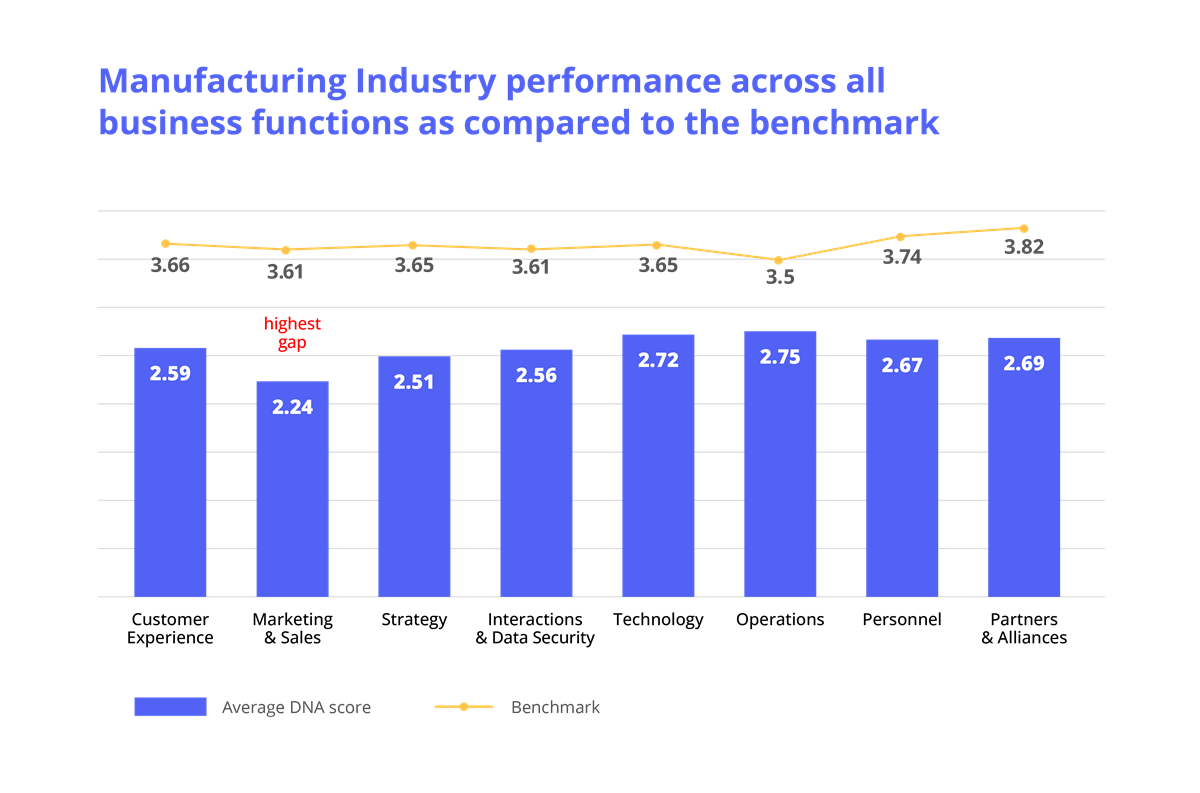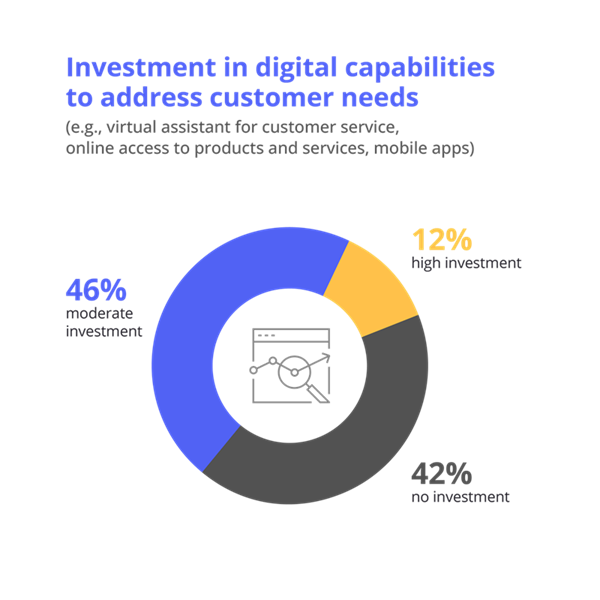In a world where growth capital is hard to come by, it is critical for Ontario's founders and business owners to adopt strategic approaches to fuel organic growth. However, findings from our Digital Needs Assessment (DNA) survey indicate that startups and small businesses in Ontario are falling behind international counterparts in adopting the tools needed to drive growth.
The Digital Needs Assessment, a survey measuring the digital capabilities of Ontario’s small and medium-sized businesses, reveals a concerning trend: despite being situated in a tech-savvy region, most small businesses and startups in our region are falling short of meeting global best-in-class industry benchmarks in digital readiness.
With the Toronto-Waterloo corridor being ranked as North America’s 3rd largest tech hub and the fastest-growing tech market, these findings might surprise many. This prompted us to look deeper into the data, identify specific areas of shortcomings and outline actionable steps for SME entrepreneurs and owners like you to embrace and integrate digital technologies effectively.
The data showed that the digital adoption gap is largest in two key areas:
- Marketing and sales optimization
- Enhancing customer interactions

In the quest to drive organic growth in a global marketplace, businesses must prioritize these areas to be able to compete. This may be the reason why SMEs in our region, despite having strong intellectual property and well-crafted products, face challenges in reaching their full potential.

How does this impact SME entrepreneurs and founders?
The failure to adopt digital tools and strategies impedes efficient expansion, hindering scaling while limiting growth potential. Typically, the absence of digital tools and processes not only increases operational costs but also restricts the business's capacity to compete successfully. This, in turn, forces premature exits and heightens the risk of stagnation and even bankruptcy.
Unpacking the Challenges:
The findings from the DNA survey, echoes Charles Plant’s “Canada’s Marketing and Sales Challenge,” arriving at a similar conclusion: Canadian companies fail to build sufficient sales and marketing capacity. This deficiency is evident in our survey, especially in the digital readiness of small tech and manufacturing firms, with manufacturing firms trailing other surveyed industries by as much as 38%.
Failing to prioritise the adoption of sales and marketing technology, some of which is available at low or no cost, will over time undermine any organic growth strategy, either by contributing to higher customer acquisition cost or lower operational capacity.

The data also highlighted another critical trend: Companies that are experiencing rising annual sales are laser-focused on acquiring new business. Even within our growing tech sector, the DNA survey revealed that investments driving new customer acquisition often eclipse budgets allocated to improving existing customer relationships. Acquiring new customers is important, but in order to hit consistent growth, founders and owners need to ensure they’re not leaking customers while busy adding new ones.

Solutions for SME Entrepreneurs:
The good news is that solutions are available! By increasing the adoption of digital tools, companies can not only survive but also thrive and scale.
There is an untapped reservoir of potential in easy to adopt technologies like content marketing and marketing automation tools. If you’re a SME owner or entrepreneur, embracing these low-cost scaling solutions could boost your sales and marketing efforts.
While pursuing new business opportunities is vital, successful founders know that growth only takes off once you can retain a significant share of existing customers. Leveraging customer intelligence platforms like CRM and analytics tools, can allow businesses to grow while cost-effectively servicing and engaging existing customers.
To foster significant growth, it is essential to invest efforts not only in refining your product and operations but also in building the productive capacity of your business i.e., Marketing and Sales, Customer Experience. Allocate time and resources to enhance the overall capabilities and infrastructure, ensuring a comprehensive approach to sustainable development.
The World Trade Centre Toronto (WTC-T) is the trade services and scale-up arm of the Board. Its goal is to deliver best-in-class programs to help businesses build strategies and enhance their trade and growth plans. To gain more such insights and assess your business capabilities, consider taking PULSE.
Ontario's SMEs stand on the brink of transformative growth. Embracing digital readiness isn't just an option – it's the pathway to unlocking their true potential.
*The benchmark data is sourced from Environics Analytics, a reputable Data & Analytics Services Company, derived from their comprehensive study conducted in 2021.
Introduced in March 2021, the Digital Needs Assessment (DNA) offered by the World Trade Centre Toronto serves as an extensive online evaluation designed to identify the digital capabilities and gaps within participating businesses. Consisting of 40 questions, this survey delivers a holistic insight into the digital maturity of a business, evaluating it against industry standards and benchmarks. The insights unveiled are drawn from data collected between March 2021 and December 2022, encompassing responses from over 560 companies generating revenue surpassing CAD 50K.
